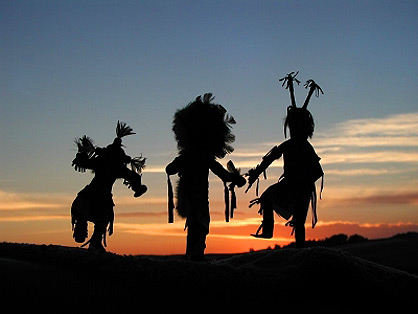 It was once said that this world, the one we are apparently residing in, the theater of our triumphs and follies, was the best of all possible worlds. In this view it was some far off, glimmering general aggregate which was the measure of the world's being good or evil. The particular sufferings of individual human beings, let alone other living creatures, were only relevant to the extent that they added up to a whole. And in the best possible world theory, when you add it all up, things aren't that bad. If this sounds like the blithering blather of a well-dressed, wig-wearing, buckled-shoe dandy of a philosopher that's because it is, or was.
It was once said that this world, the one we are apparently residing in, the theater of our triumphs and follies, was the best of all possible worlds. In this view it was some far off, glimmering general aggregate which was the measure of the world's being good or evil. The particular sufferings of individual human beings, let alone other living creatures, were only relevant to the extent that they added up to a whole. And in the best possible world theory, when you add it all up, things aren't that bad. If this sounds like the blithering blather of a well-dressed, wig-wearing, buckled-shoe dandy of a philosopher that's because it is, or was.In the olden golden times, philosophers thought this was a serious question, that is, Is this the best of all possible worlds? Assuming the world was created, could it have been created any different? Did the particular arrangement which we see all around us, and which appears to be natural, have been made different? Perhaps animals could have gone without a central nervous system which would have saved them from feeling pain, or pleasure for that matter. And as pleasure is never as good as we expected and pain always worse than we had imagined, perhaps no sensations whatsoever would have been better than our present situation. Natural evils, cold, damp, hunger are other examples. Children, old people and all in between continue to die for lack of shelter and food. If the world was created, why was it created to inflict its inhabitants with these painful, distressing absurdities?
Then we arrive at the evils committed by humans against one another. The idiot murderers in Mumbai last week offer strikingly clear examples. How is it that a world each of us is born into whether we would like it or not supplies us with the conditions and freedoms that we may slaughter each other? If the world was created, surely our ability to inflict harm and death could have been withheld. Imagine it: God, stroking his manly beard, his brow furrowed in concentration, looks at his to-do list. The moon and the tides? Check. Sunsets and sunrises? Check. Abundant living creatures big and small? Check. Humanity's ability to commit atrocities? Check, and double check. Here he underlined it to emphasize his point, I guess. Our murderous barbaric side has traditionally been accounted for by God's imbuing in us a will to choose our own paths. That way both our good and bad deeds are our own responsibility, and our freely choosing to act in certain ways means that it is up to us to become a saint or a devil.
But in our present age, when a seemingly limitless supply of people are willing to massacre to fulfill the narrow aims of their narrow perspectives, who can credibly say that things couldn't be any different? Today in the secular West, the old question about the best possible worlds strikes us as quaintly obsolete, a charming fable out of a forgotten book. But just because we've moved on to other things, like Britney Spears and Nintendo Wiis, doesn't mean that thinkers in other cultures have abandoned the problem. The geniuses who believe that by committing mass atrocities they will bring about the will of God certainly haven't forgotten it.
Talk of how things "should be" has for too long been mired in an apologist's shame over the past injustices, indeed massacres, which the supposedly enlightened West has perpetrated on others. It is an important insight to acknowledge that while you live one way, others may live a very different way. But this admission of difference and relative values and belief systems should not over shadow the true commonalities we all share on this small planet. So without hesitating I declare: Our world is not the best it could be! It could be different! And to the rampaging ape-men who get a chill of excitement when they feel a gun in their hands I join John Oliver in saying fuck the fucking fuckers!

1 comment:
To quote one of my favourite philosophers, Lux Interior-
"People Ain't no good..."
Post a Comment